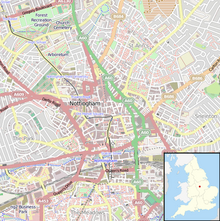Byard Lane
 5 Byard Lane (1865-66) | |||
 Location within Central Nottingham | |||
| Maintained by | Nottingham City Council | ||
|---|---|---|---|
| Coordinates | 52°57′07″N 1°08′52″W / 52.9519°N 1.1479°WCoordinates: 52°57′07″N 1°08′52″W / 52.9519°N 1.1479°W | ||
Byard Lane is a pedestrianised shopping street in the city centre of Nottingham, England located between Fletcher Gate and Bridlesmith Gate.
History[]
Byard Lane has existed since the Middle Ages when it was known as Walleonelane, Walloonlane or Wooler Lane[1] probably a corruption of Wall-On Lane as it abutted the town defences.
In 1757, the early history of Methodism in the town had its roots here when Mary White hosted John Nelson and other early Methodists in her house in Chapel Court off Byard Lane. Chapel Court has now disappeared.
In the early 19th century, the Harlequin Public House and Bakehouse was at the top of the street.[2]
In 1866 it became known as Dining Hall Street[3] but it continued to be referred to by its former name and eventually Dining Hall Street was dropped and it reverted over time to Byard Lane.
Notable buildings[]
North side[]
- 5, Dining Rooms by Thomas Simpson 1865-66[4] Grade II listed.[5]
- 7-9, by Hedley John Price. Grade II listed.[6]
- 15, Cross Keys Public House. Grade II listed[7] by Robert Evans JP and Robert Evans (Jun).[8]
South side[]
- 6 Shop for Paul Smith from 1970 until 2017.[9]
References[]
| Wikimedia Commons has media related to Category:Byard Lane, Nottingham. |
- ^ Stevenson, W.H. (1882). Records of the Borough of Nottingham. p. 440. ISBN 5877619063.
- ^ "Harlequin Public House and Bakehouse". Nottingham Journal. England. 15 June 1811. Retrieved 23 February 2019 – via British Newspaper Archive.
- ^ "Dining Hall Street". Nottinghamshire Guardian. England. 2 March 1866. Retrieved 23 February 2019 – via British Newspaper Archive.
- ^ "The Working Men's Dining Hall". Nottinghamshire Guardian. England. 9 March 1866. Retrieved 23 February 2019 – via British Newspaper Archive.
- ^ Historic England. "5, Byard Lane (1246297)". National Heritage List for England. Retrieved 23 February 2019.
- ^ Historic England. "7, Byard Lane (1246298)". National Heritage List for England. Retrieved 23 February 2019.
- ^ Historic England. "Cross Keys Public House (1270823)". National Heritage List for England. Retrieved 23 February 2019.
- ^ Harwood, Elain (2008). Pevsner Architectural Guides. Nottingham. Yale University Press. p. 94. ISBN 9780300126662.
- ^ Pittam, David (22 August 2017). "'Iconic' Paul Smith store in Nottingham city centre closes down". Nottingham Post.
- Nottingham
- Streets in Nottingham
